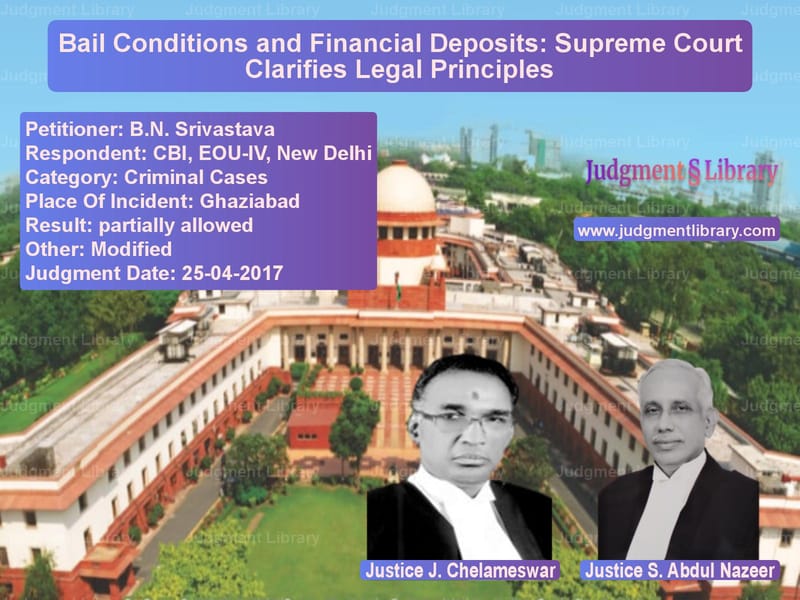Bail Conditions and Financial Deposits: Supreme Court Clarifies Legal Principles
The Supreme Court of India, in a significant ruling in the case of B.N. Srivastava vs. CBI, addressed the legal question of imposing financial conditions as a prerequisite for granting bail. The ruling is a landmark judgment that highlights the balance between safeguarding the legal rights of the accused and ensuring justice in financial fraud and corruption cases.
Background of the Case
The appellant, B.N. Srivastava, was accused in a corruption case being investigated by the Central Bureau of Investigation (CBI), Economic Offences Unit-IV, New Delhi. The case was registered under the Prevention of Corruption Act, and the accused was placed in custody. After spending a significant time in judicial custody, the appellant sought bail from the Special Judge, Prevention of Corruption, CBI, Ghaziabad.
On April 28, 2016, the Special Court granted bail, but imposed stringent conditions, which included:
- The accused shall not tamper with evidence during the trial.
- The accused shall not pressurize or intimidate prosecution witnesses.
- The accused shall personally appear before the trial court on all scheduled dates.
- The accused shall surrender his passport to prevent flight risk.
- The accused shall furnish two personal bonds of Rs. 50,000 each with two bail sureties.
- The accused shall deposit Rs. 50 lakh in the court within four weeks of his release on bail.
The appellant challenged this condition before the High Court of Judicature at Allahabad, arguing that requiring a monetary deposit for bail was excessive and amounted to an indirect punishment before conviction.
High Court Proceedings
The Allahabad High Court considered the appellant’s plea and, in an interim order dated May 31, 2016, stayed the requirement of depositing Rs. 50 lakh. However, it directed the appellant to deposit Rs. 10 lakh within one month.
The appellant complied and deposited Rs. 10 lakh. However, on November 11, 2016, the High Court dismissed the appellant’s petition, thereby upholding the lower court’s order requiring the remaining deposit amount.
Arguments by the Petitioner
The appellant, B.N. Srivastava, contended that:
- The condition of depositing Rs. 50 lakh for bail was arbitrary and excessive.
- It amounted to an economic barrier to securing bail, which violated the fundamental right to liberty.
- Other co-accused, namely B.N. Yadav and R.K. Singh, had been granted bail without any financial deposit conditions.
- He had already spent over four years in custody, making the deposit unnecessary.
The petitioner argued that the Supreme Court had previously ruled in similar cases that financial conditions should not be excessive or unreasonable as they could disproportionately affect the right to bail.
Arguments by the Respondent
The CBI, represented by the respondent, contended that:
- The financial loss caused by the corruption case was significant, and thus, the deposit was justified.
- There was a risk that the accused could influence witnesses or tamper with evidence.
- Imposing a financial condition ensured the commitment of the accused to stand trial.
The prosecution emphasized that cases involving corruption and economic offenses should be treated differently from general criminal cases, as they involve public money and financial harm to the state.
Supreme Court’s Judgment
The Supreme Court, after reviewing the case, held that the financial condition of depositing Rs. 50 lakh as a prerequisite for bail was onerous and excessive. The Court noted:
“Bail is a matter of personal liberty, and while conditions can be imposed to ensure the accused’s presence in court, financial deposits should not be used as a tool for punishment.”
The Court ruled that since the appellant had already deposited Rs. 10 lakh, this amount was sufficient for granting bail. The Court modified the lower court’s order, removing the requirement of the Rs. 50 lakh deposit and directed that the appellant be released upon fulfilling other bail conditions.
Key Takeaways from the Judgment
- Excessive financial conditions for bail should not be imposed, as they may act as an indirect punishment.
- Bail conditions should be fair and justifiable, ensuring the accused’s presence without causing undue hardship.
- Economic offenses do require strict scrutiny, but financial penalties should not be pre-trial obligations.
- Courts must ensure uniformity in bail conditions among co-accused individuals.
Impact of the Judgment
This ruling is a crucial precedent in the context of bail conditions in India. It ensures that the right to bail is not curtailed by imposing excessive financial burdens, particularly in white-collar crimes. The judgment also reinforces that bail conditions must be proportionate and applied consistently among co-accused individuals.
Conclusion
The Supreme Court’s ruling in B.N. Srivastava vs. CBI has reinforced the legal principle that financial conditions imposed for bail should be reasonable and not amount to an indirect punishment. By modifying the Rs. 50 lakh deposit condition, the Court ensured that bail remains a right rather than a privilege reserved only for those who can afford it.
Don’t miss out on the full details! Download the complete judgment in PDF format below and gain valuable insights instantly!
Download Judgment: B.N. Srivastava vs CBI, EOU-IV, New Del Supreme Court of India Judgment Dated 25-04-2017.pdf
Direct Downlaod Judgment: Direct downlaod this Judgment
See all petitions in Bail and Anticipatory Bail
See all petitions in Fraud and Forgery
See all petitions in Money Laundering Cases
See all petitions in Judgment by J. Chelameswar
See all petitions in Judgment by S. Abdul Nazeer
See all petitions in partially allowed
See all petitions in Modified
See all petitions in supreme court of India judgments April 2017
See all petitions in 2017 judgments
See all posts in Criminal Cases Category
See all allowed petitions in Criminal Cases Category
See all Dismissed petitions in Criminal Cases Category
See all partially allowed petitions in Criminal Cases Category







